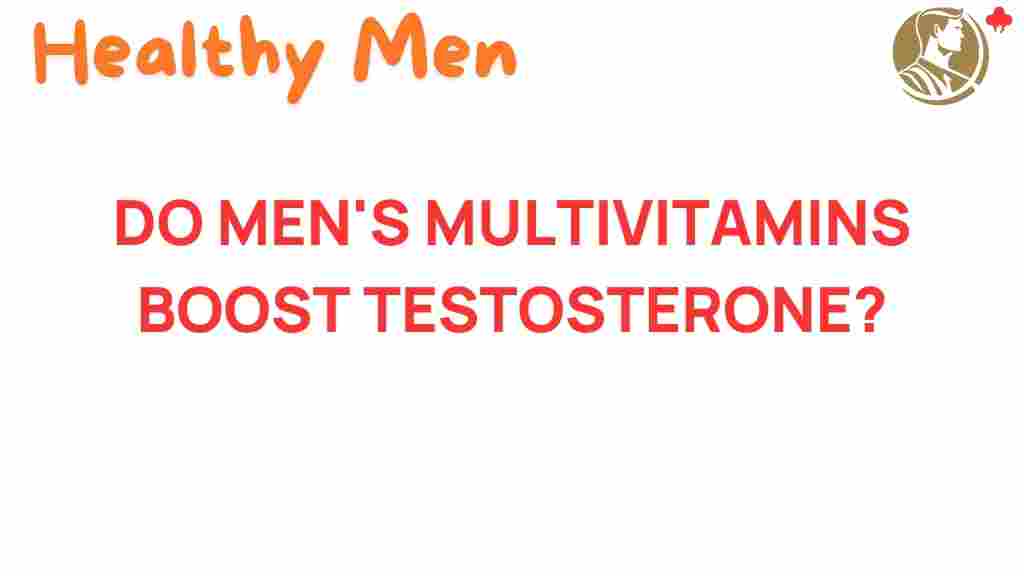Unveiling the Truth: Do Men’s Multivitamins Really Boost Testosterone?
In today’s fast-paced world, maintaining optimal health has become a priority for many, particularly for men striving for peak performance in fitness, nutrition, and overall wellness. Among the myriad of health supplements available, men’s multivitamins have gained popularity, with claims that they can offer a testosterone boost. But do these vitamins really enhance testosterone levels? In this article, we will delve into the relationship between men’s multivitamins and testosterone, exploring their potential benefits, dietary impact, and what the latest research says.
Understanding Testosterone and Its Importance
Testosterone is a vital hormone primarily produced in the testicles, playing a crucial role in male health. It influences various aspects of wellness, including:
- Muscle mass and strength
- Fat distribution
- Bone density
- Sex drive (libido)
- Mood and energy levels
As men age, testosterone levels naturally decline, which can lead to various health issues, such as reduced physical performance, decreased energy, and diminished sexual health. This decline has prompted many men to seek ways to boost their testosterone levels, including through the use of health supplements like men’s multivitamins.
The Role of Men’s Multivitamins in Hormonal Health
Men’s multivitamins are formulated to support male wellness by providing essential vitamins and minerals that may be lacking in the diet. Common ingredients include:
- Vitamin D
- Zinc
- Magnesium
- B vitamins
- Selenium
Each of these nutrients plays a role in maintaining hormonal health. For example, vitamin D has been linked to testosterone production, while zinc is essential for maintaining normal testosterone levels.
Do Men’s Multivitamins Really Boost Testosterone?
The effectiveness of men’s multivitamins in boosting testosterone levels is a subject of ongoing research. Some studies suggest that certain nutrients found in these supplements may contribute to maintaining or even increasing testosterone levels. Here’s a closer look:
1. Vitamin D
Vitamin D is critical for overall health and has been associated with testosterone levels. Research indicates that men with sufficient vitamin D levels tend to have higher testosterone than those who are deficient. Supplementing with vitamin D, particularly in those who are deficient, may support hormonal health.
2. Zinc
Zinc deficiency can lead to reduced testosterone levels. Studies have shown that zinc supplementation can help restore testosterone levels in men who are deficient. Including zinc in men’s multivitamins can be beneficial for those lacking this essential mineral.
3. Magnesium
Magnesium plays a role in various bodily functions, including testosterone production. Some studies suggest that magnesium supplementation may positively impact testosterone levels, especially in physically active individuals.
The Dietary Impact of Men’s Multivitamins
While men’s multivitamins can help fill nutritional gaps, they should not replace a balanced diet. Proper nutrition is crucial for maintaining hormonal health and achieving a testosterone boost. Here are some dietary considerations:
- Include healthy fats: Foods rich in healthy fats, such as avocados, nuts, and olive oil, support hormone production.
- Prioritize protein: Adequate protein intake is essential for muscle building and can indirectly influence testosterone levels.
- Consume plenty of fruits and vegetables: These provide antioxidants, vitamins, and minerals necessary for overall health.
- Stay hydrated: Dehydration can negatively impact energy levels and performance.
Integrating Men’s Multivitamins into Your Routine
To effectively integrate men’s multivitamins into your health regimen, follow these steps:
Step 1: Assess Your Nutritional Needs
Consider your current diet and lifestyle. Are you getting enough essential vitamins and minerals? Understanding your nutritional gaps can help you choose the right multivitamin.
Step 2: Choose the Right Multivitamin
Look for men’s multivitamins that contain key nutrients linked to testosterone production, such as vitamin D, zinc, and magnesium. Read labels carefully to ensure they meet your health needs.
Step 3: Consult a Healthcare Professional
Before beginning any new supplement, consult with a healthcare professional. They can provide personalized advice based on your health status and goals.
Step 4: Monitor Your Progress
After starting your multivitamin, keep track of any changes in your energy levels, physical performance, and mood. This can help you determine if the supplement is making a positive impact.
Troubleshooting Common Issues
While men’s multivitamins can be beneficial, some men may experience issues such as:
- Gastrointestinal discomfort: If you experience an upset stomach, try taking the multivitamin with food.
- Interactions with medications: Always inform your doctor about any supplements you are taking to avoid potential interactions.
- Not seeing results: Remember that supplements alone may not lead to significant changes. A combination of a balanced diet, regular exercise, and healthy lifestyle choices is essential for optimal testosterone levels.
Conclusion
In summary, men’s multivitamins can play a role in supporting testosterone levels and overall hormonal health, particularly when they include key nutrients like vitamin D, zinc, and magnesium. While these supplements can help fill dietary gaps, they should not replace a balanced diet and healthy lifestyle choices. For men seeking a testosterone boost, it’s vital to approach it holistically by combining nutrition, exercise, and proper supplementation.
For more information on men’s health and nutrition, consider visiting this comprehensive guide. If you’re looking to purchase high-quality health supplements, check out this trusted site for options tailored to your needs.
Ultimately, a proactive approach to male wellness, incorporating men’s multivitamins as part of a comprehensive health strategy, can lead to improved fitness, nutrition, and hormonal health.
This article is in the category Nutrition and created by healthymen Team
